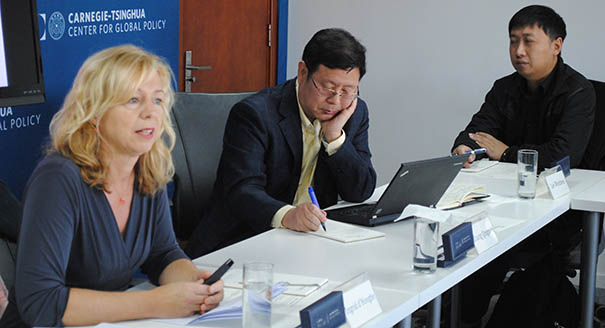Registration
You will receive an email confirming your registration.
As China’s economy has grown, the country’s cultural impact on the world has also expanded. Beijing’s recent soft power initiatives include broadening the size of Chinese state media’s overseas audience, increasing the worldwide number of Confucius Institutes to 1,000 by 2020, and bidding to host the 2022 Winter Olympics. Through these efforts, China is seeking to refine its global image and establish the country as a key driver of cultural and social trends. How successful has this approach been for enhancing China’s reputation around the world and what remains to be done?
To examine how the Chinese government develops its public diplomacy though Chinese culture, history, and social discourse, Ingrid d’Hooghe presented the findings from her upcoming book China’s Public Diplomacy. Afterward, Zhang Lihua moderated a discussion.
Discussion Highlights
- Image-Conscious: China is very aware of the image it projects globally. The panelists agreed that this consciousness about popular perceptions reflects Beijing’s deep desire for other countries to understand and appreciate China and its policies as the country pursues prosperity and renewed historical greatness. Panelists observed that image is especially important in China where “face” and prestige carry great weight and memories of China’s century of humiliation remain at the forefront of the national psyche.
- Managing Image Through Public Diplomacy: In public diplomacy, governments direct efforts toward non-state actors to win public sympathy and support for their policies. Such initiatives might include press conferences, community events, and social media. The panelists observed that Beijing views public diplomacy as an invaluable tool in improving international perceptions of China. They asserted that China’s leaders hope that they can use their country's rich cultural heritage and rapid rise to enhance the country’s image and soft power.
- Deep Investment in Public Diplomacy: Beijing’s diverse public diplomacy initiatives include short-term events such as the 2008 Summer Olympics, long-term institutional programs like the globe-spanning Confucius Institutes, and state media coverage. Panelists noted that high-profile initiatives like the Olympics and Confucius Institutes require substantial funding, demonstrating the depth of Beijing’s commitment. Personal narratives, like former premier Wen Jiabao directing relief efforts after the 2008 Sichuan earthquake, also garnered goodwill for China from overseas audiences, panelists added.
- Unique Public Diplomacy: The nature of China’s public diplomacy is tied closely to the country’s singular sociopolitical context, panelists agreed. They concluded that China does not fit neatly into established theoretical models of public diplomacy. China’s public diplomacy management is far more hierarchical and state-centered than that of other countries. Although non-state actors participate, their involvement is generally aligned with centralized government objectives.
- Obstacles to Effective Public Diplomacy: Despite China’s sizable fiscal investment in public diplomacy, data from the PEW Global Attitudes Project suggest that popular opinions toward China have declined in recent years in North America and Europe, where much of this funding is directed. The panelists concluded that public diplomacy’s efficacy is difficult to measure, since the topic is under-researched and theoretical models remain speculative. Moreover, one panelist pointed out that public diplomacy is inextricably tied to a country’s internal policies. In policy areas where conflict and mistrust abound, public diplomacy will generally produce limited benefits.
Ingrid d'Hooghe
Ingrid d'Hooghe is senior research associate at Clingendael, the Netherlands Instituteof International Relations. D’Hooghe researches and lectures on China's foreign policy and diplomacy. She has worked as a policy officer at the Netherlands embassy in Beijing and the Netherlands embassy in Washington, D.C. Her publications include articles on China's soft power and public diplomacy, China-U.S. relations, and China-EU relations.
Zhang Lihua
Zhang Lihua is a resident scholar at the Carnegie–Tsinghua Center for Global Policy, where she examines how China’s core values affect Chinese foreign policy. Zhang is also director of the European Studies Center at Tsinghua University’s Institute of International Studies. Her other research interests include political theory, European politics, and contemporary Chinese politics and diplomacy.
Pang Xun
Pang Xun is a resident scholar and a co-director of the Carnegie–Tsinghua Center for Global Policy. Pang is also an associate professor at Tsinghua University’s School of Social Sciences. Her recent research focuses on international development, emerging economies, and international governance.
